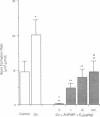Abstract
Estrogen is generally considered to maintain bone mass through suppression of bone resorption. We have previously demonstrated that administration of pharmacologic doses of estrogen increases bone formation in ovary-intact rats. To assess the effects of physiological concentrations of estrogen on bone formation, estrogen was administered to ovariectomized rats in which bone resorption was suppressed by the bisphosphonate 3-amino-1-hydroxypropylidene-1-bisphosphonate (AHPrBP). Animals receiving exogenous 17 beta-estradiol (E2) (1, 10, and 100 micrograms/kg daily for 17 d) showed a dose-dependent increase in trabecular bone volume of 1.9, 25.8, and 43.6%, respectively, compared with those rats treated with AHPrBP alone. The increase in bone volume was associated with an increase in bone formation in E2-treated animals, in which bone resorption had been almost completely suppressed by AHPrBP. Neither ovariectomy, AHPrBP, nor E2 treatment had a significant effect on the volume or rate of formation of cortical bone. Thus, the increased bone resorption, which is a consequence of estrogen-deficiency, entrains increased bone formation, which masks a simultaneous reduction in estrogen-dependent bone formation. Therefore, in addition to the nonspecific effect of estrogen to depress formation via coupling, we have identified a specific effect of estrogen to increase formation independent of coupling. Thus it appears that estrogen maintains bone volume not only through inhibition of bone resorption, but also through stimulation of bone formation.
Full text
PDF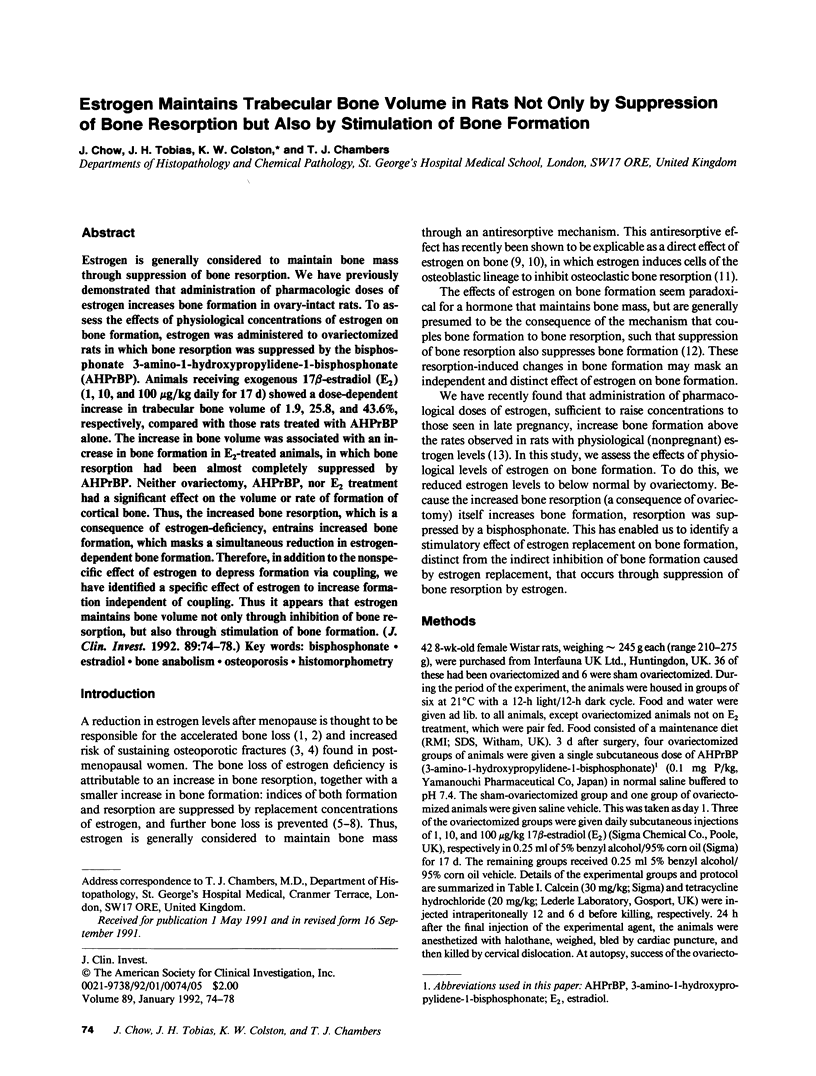
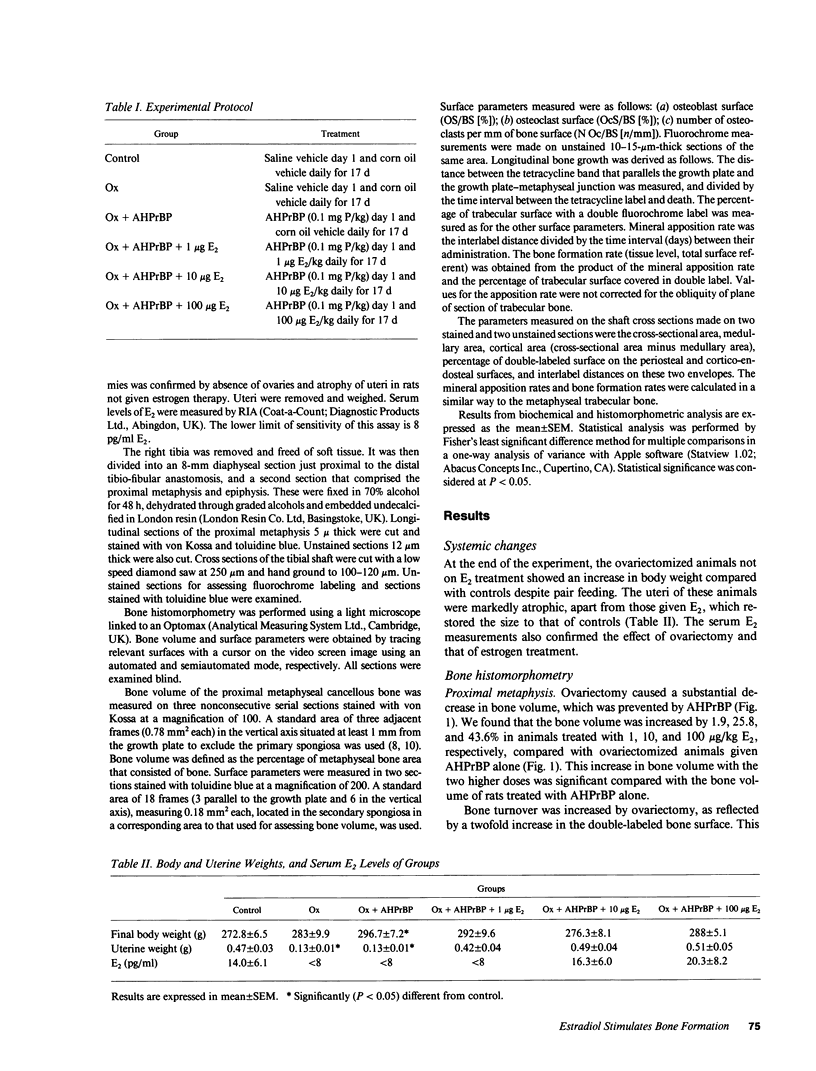
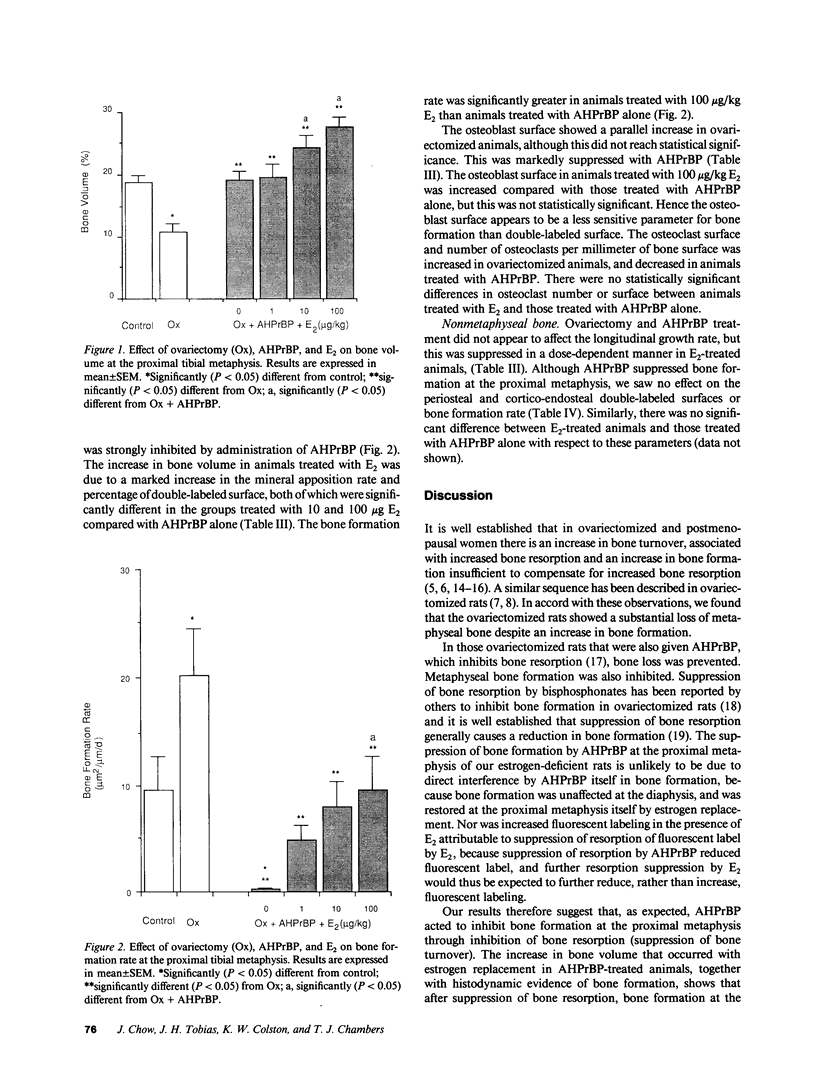

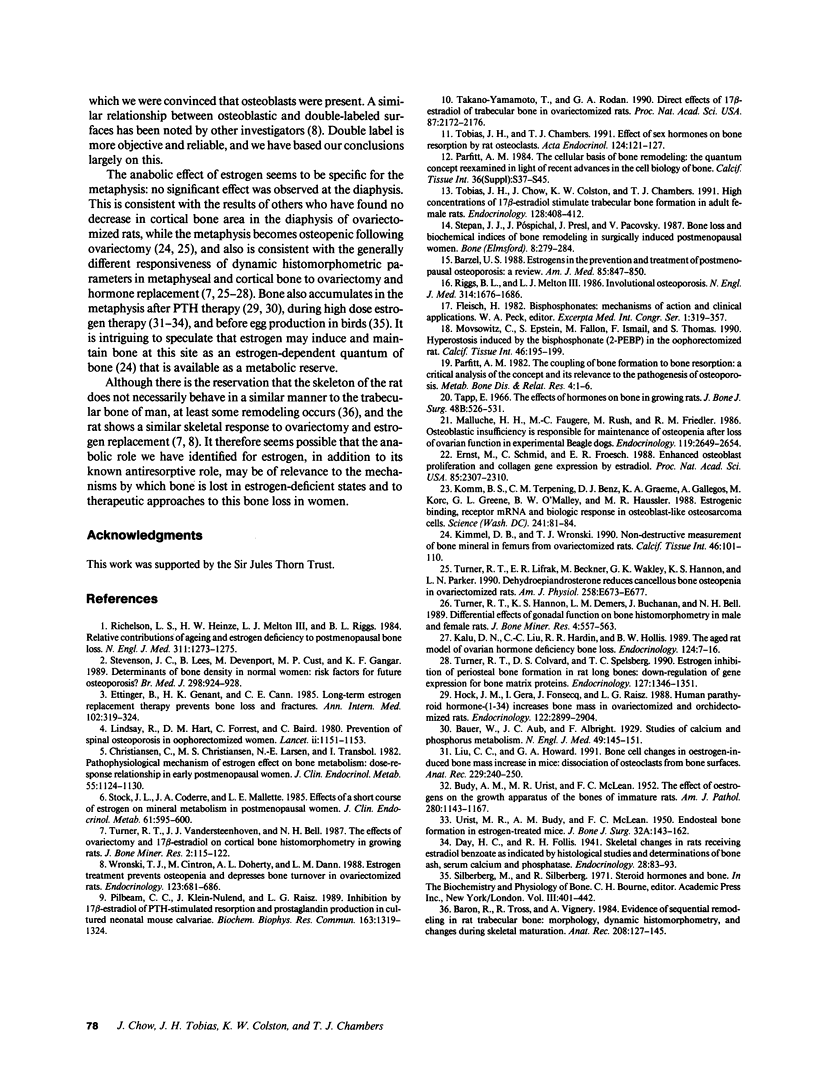
Images in this article
Selected References
These references are in PubMed. This may not be the complete list of references from this article.
- BUDY A. M., URIST M. R., MCLEAN F. C. The effect of estrogens on the growth apparatus of the bones of immature rats. Am J Pathol. 1952 Nov-Dec;28(6):1143–1167. [PMC free article] [PubMed] [Google Scholar]
- Baron R., Tross R., Vignery A. Evidence of sequential remodeling in rat trabecular bone: morphology, dynamic histomorphometry, and changes during skeletal maturation. Anat Rec. 1984 Jan;208(1):137–145. doi: 10.1002/ar.1092080114. [DOI] [PubMed] [Google Scholar]
- Barzel U. S. Estrogens in the prevention and treatment of postmenopausal osteoporosis: a review. Am J Med. 1988 Dec;85(6):847–850. doi: 10.1016/s0002-9343(88)80033-0. [DOI] [PubMed] [Google Scholar]
- Christiansen C., Christensen M. S., Larsen N. E., Transbøl I. B. Pathophysiological mechanisms of estrogen effect on bone metabolism. Dose-response relationships in early postmenopausal women. J Clin Endocrinol Metab. 1982 Dec;55(6):1124–1130. doi: 10.1210/jcem-55-6-1124. [DOI] [PubMed] [Google Scholar]
- Ernst M., Schmid C., Froesch E. R. Enhanced osteoblast proliferation and collagen gene expression by estradiol. Proc Natl Acad Sci U S A. 1988 Apr;85(7):2307–2310. doi: 10.1073/pnas.85.7.2307. [DOI] [PMC free article] [PubMed] [Google Scholar]
- Ettinger B., Genant H. K., Cann C. E. Long-term estrogen replacement therapy prevents bone loss and fractures. Ann Intern Med. 1985 Mar;102(3):319–324. doi: 10.7326/0003-4819-102-3-319. [DOI] [PubMed] [Google Scholar]
- Hock J. M., Gera I., Fonseca J., Raisz L. G. Human parathyroid hormone-(1-34) increases bone mass in ovariectomized and orchidectomized rats. Endocrinology. 1988 Jun;122(6):2899–2904. doi: 10.1210/endo-122-6-2899. [DOI] [PubMed] [Google Scholar]
- Kalu D. N., Liu C. C., Hardin R. R., Hollis B. W. The aged rat model of ovarian hormone deficiency bone loss. Endocrinology. 1989 Jan;124(1):7–16. doi: 10.1210/endo-124-1-7. [DOI] [PubMed] [Google Scholar]
- Kimmel D. B., Wronski T. J. Nondestructive measurement of bone mineral in femurs from ovariectomized rats. Calcif Tissue Int. 1990 Feb;46(2):101–110. doi: 10.1007/BF02556093. [DOI] [PubMed] [Google Scholar]
- Komm B. S., Terpening C. M., Benz D. J., Graeme K. A., Gallegos A., Korc M., Greene G. L., O'Malley B. W., Haussler M. R. Estrogen binding, receptor mRNA, and biologic response in osteoblast-like osteosarcoma cells. Science. 1988 Jul 1;241(4861):81–84. doi: 10.1126/science.3164526. [DOI] [PubMed] [Google Scholar]
- Liu C. C., Howard G. A. Bone-cell changes in estrogen-induced bone-mass increase in mice: dissociation of osteoclasts from bone surfaces. Anat Rec. 1991 Feb;229(2):240–250. doi: 10.1002/ar.1092290211. [DOI] [PubMed] [Google Scholar]
- Malluche H. H., Faugere M. C., Rush M., Friedler R. Osteoblastic insufficiency is responsible for maintenance of osteopenia after loss of ovarian function in experimental beagle dogs. Endocrinology. 1986 Dec;119(6):2649–2654. doi: 10.1210/endo-119-6-2649. [DOI] [PubMed] [Google Scholar]
- Movsowitz C., Epstein S., Fallon M., Ismail F., Thomas S. Hyperostosis induced by the bisphosphonate (2-PEBP) in the oophorectomized rat. Calcif Tissue Int. 1990 Mar;46(3):195–199. doi: 10.1007/BF02555044. [DOI] [PubMed] [Google Scholar]
- Parfitt A. M. The cellular basis of bone remodeling: the quantum concept reexamined in light of recent advances in the cell biology of bone. Calcif Tissue Int. 1984;36 (Suppl 1):S37–S45. doi: 10.1007/BF02406132. [DOI] [PubMed] [Google Scholar]
- Parfitt A. M. The coupling of bone formation to bone resorption: a critical analysis of the concept and of its relevance to the pathogenesis of osteoporosis. Metab Bone Dis Relat Res. 1982;4(1):1–6. doi: 10.1016/0221-8747(82)90002-9. [DOI] [PubMed] [Google Scholar]
- Pilbeam C. C., Klein-Nulend J., Raisz L. G. Inhibition by 17 beta-estradiol of PTH stimulated resorption and prostaglandin production in cultured neonatal mouse calvariae. Biochem Biophys Res Commun. 1989 Sep 29;163(3):1319–1324. doi: 10.1016/0006-291x(89)91122-4. [DOI] [PubMed] [Google Scholar]
- Richelson L. S., Wahner H. W., Melton L. J., 3rd, Riggs B. L. Relative contributions of aging and estrogen deficiency to postmenopausal bone loss. N Engl J Med. 1984 Nov 15;311(20):1273–1275. doi: 10.1056/NEJM198411153112002. [DOI] [PubMed] [Google Scholar]
- Riggs B. L., Melton L. J., 3rd Involutional osteoporosis. N Engl J Med. 1986 Jun 26;314(26):1676–1686. doi: 10.1056/NEJM198606263142605. [DOI] [PubMed] [Google Scholar]
- Stepán J. J., Pospíchal J., Presl J., Pacovský V. Bone loss and biochemical indices of bone remodeling in surgically induced postmenopausal women. Bone. 1987;8(5):279–284. doi: 10.1016/8756-3282(87)90002-0. [DOI] [PubMed] [Google Scholar]
- Stevenson J. C., Lees B., Devenport M., Cust M. P., Ganger K. F. Determinants of bone density in normal women: risk factors for future osteoporosis? BMJ. 1989 Apr 8;298(6678):924–928. doi: 10.1136/bmj.298.6678.924. [DOI] [PMC free article] [PubMed] [Google Scholar]
- Stock J. L., Coderre J. A., Mallette L. E. Effects of a short course of estrogen on mineral metabolism in postmenopausal women. J Clin Endocrinol Metab. 1985 Oct;61(4):595–600. doi: 10.1210/jcem-61-4-595. [DOI] [PubMed] [Google Scholar]
- Takano-Yamamoto T., Rodan G. A. Direct effects of 17 beta-estradiol on trabecular bone in ovariectomized rats. Proc Natl Acad Sci U S A. 1990 Mar;87(6):2172–2176. doi: 10.1073/pnas.87.6.2172. [DOI] [PMC free article] [PubMed] [Google Scholar]
- Tapp E. The effects of hormones on bone in growing rats. J Bone Joint Surg Br. 1966 Aug;48(3):526–531. [PubMed] [Google Scholar]
- Tobias J. H., Chambers T. J. The effect of sex hormones on bone resorption by rat osteoclasts. Acta Endocrinol (Copenh) 1991 Jan;124(1):121–127. doi: 10.1530/acta.0.1240121. [DOI] [PubMed] [Google Scholar]
- Tobias J. H., Chow J., Colston K. W., Chambers T. J. High concentrations of 17 beta-estradiol stimulate trabecular bone formation in adult female rats. Endocrinology. 1991 Jan;128(1):408–412. doi: 10.1210/endo-128-1-408. [DOI] [PubMed] [Google Scholar]
- Turner R. T., Colvard D. S., Spelsberg T. C. Estrogen inhibition of periosteal bone formation in rat long bones: down-regulation of gene expression for bone matrix proteins. Endocrinology. 1990 Sep;127(3):1346–1351. doi: 10.1210/endo-127-3-1346. [DOI] [PubMed] [Google Scholar]
- Turner R. T., Hannon K. S., Demers L. M., Buchanan J., Bell N. H. Differential effects of gonadal function on bone histomorphometry in male and female rats. J Bone Miner Res. 1989 Aug;4(4):557–563. doi: 10.1002/jbmr.5650040415. [DOI] [PubMed] [Google Scholar]
- Turner R. T., Lifrak E. T., Beckner M., Wakley G. K., Hannon K. S., Parker L. N. Dehydroepiandrosterone reduces cancellous bone osteopenia in ovariectomized rats. Am J Physiol. 1990 Apr;258(4 Pt 1):E673–E677. doi: 10.1152/ajpendo.1990.258.4.E673. [DOI] [PubMed] [Google Scholar]
- Turner R. T., Vandersteenhoven J. J., Bell N. H. The effects of ovariectomy and 17 beta-estradiol on cortical bone histomorphometry in growing rats. J Bone Miner Res. 1987 Apr;2(2):115–122. doi: 10.1002/jbmr.5650020206. [DOI] [PubMed] [Google Scholar]
- URIST M. R., BUDY A. M., McLEAN F. C. Endosteal-bone formation in estrogen-treated mice. J Bone Joint Surg Am. 1950 Jan;32A(1):143-62, illust. [PubMed] [Google Scholar]
- Wronski T. J., Cintrón M., Doherty A. L., Dann L. M. Estrogen treatment prevents osteopenia and depresses bone turnover in ovariectomized rats. Endocrinology. 1988 Aug;123(2):681–686. doi: 10.1210/endo-123-2-681. [DOI] [PubMed] [Google Scholar]




